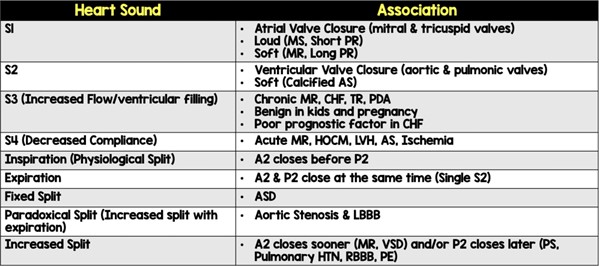The practical nurse (PN) is auscultating a client's heart sounds. Which abnormal heart sound should the PN report to the charge nurse? (Please listen to the audio file to select the option that applies.)
S4.
S2.
S1.
S3.
Correct Answer : A,D
S3 is an extra heart sound that occurs during diastole (the filling phase of the cardiac cycle). It is commonly associated with conditions such as heart failure and volume overload. S3 is often described as a low-frequency, dull, and distant sound heard after S2 (the second heart sound).
B, C- S1, and S2 are the normal heart sounds that are typically heard in all individuals. S1 is the first heart sound, heard as "lub," and is caused by the closure of the mitral and tricuspid valves. S2 is the second heart sound, heard as "dub," and is caused by the closure of the aortic and pulmonic valves. These sounds are normal and expected.
S4 is another abnormal heart sound, which occurs during late diastole and is associated with conditions such as ventricular hypertrophy and reduced ventricular compliance.

Nursing Test Bank
Naxlex Comprehensive Predictor Exams
Related Questions
Correct Answer is ["A","B","C","F","G"]
Explanation
Ataxia: Phenytoin can cause problems with coordination and balance, leading to ataxia. The PN should monitor the client for unsteady gait or difficulty with movements.
Drowsiness: Phenytoin can cause drowsiness or sedation. The PN should observe the client for excessive sleepiness or difficulty staying awake.
Altered blood coagulation: Phenytoin can affect blood clotting factors, potentially leading to altered blood coagulation. The PN should assess the client for any signs of bleeding or bruising.
Vertigo: Phenytoin can cause dizziness or vertigo, which is a spinning sensation. The PN should be alert for complaints of dizziness or any difficulty with balance.
Visual disturbances: Phenytoin can cause visual disturbances, such as blurred vision or double vision. The PN should monitor the client's vision and report any changes.
The following options are incorrect regarding the toxic effects of phenytoin:
- Anxiety: Anxiety is not a recognized toxic effect of phenytoin. However, it is important to assess the client for any signs of anxiety or emotional changes.
- Aphasia: Aphasia refers to a language impairment and is not typically associated with the toxic effects of phenytoin.
- Vomiting: While phenytoin can cause gastrointestinal side effects, such as nausea and vomiting, it is not directly related to its toxic effects. However, the PN should still monitor the client for any signs of nausea or vomiting.
Correct Answer is B
Explanation
The patient experienced a sudden guard while being assisted to the bathroom, which led to their hospitalization. The most appropriate action for the practical nurse (PN) in this situation is to prioritize the patient's safety and well-being. Returning the patient to bed and maintaining bed rest allows for stability and minimizes the risk of further complications or injury. By providing a safe and controlled environment, the PN can monitor the patient's condition and collaborate with the healthcare team to determine the appropriate course of action moving forward.
Options a), c), and d) are not relevant or appropriate in this context.
Whether you are a student looking to ace your exams or a practicing nurse seeking to enhance your expertise , our nursing education contents will empower you with the confidence and competence to make a difference in the lives of patients and become a respected leader in the healthcare field.
Visit Naxlex, invest in your future and unlock endless possibilities with our unparalleled nursing education contents today
Report Wrong Answer on the Current Question
Do you disagree with the answer? If yes, what is your expected answer? Explain.
Kindly be descriptive with the issue you are facing.
